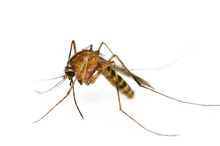Although many people in Florida expected an increase in the mosquito population after tropical storm Debby crossed the state, health officials say that the thirsty ground absorbed most of the water and the mosquito population is no larger than usual, although standing water in receptacles continues to be a breeding ground for many mosquitoes.

Mosquito threats to equine health
Prevention of mosquito-borne diseases in horses and humans includes draining standing water to keep the pests from multiplying and covering up and using mosquito repellant when outdoors.
Health Officials are particularly wary about mosquitoes because they carry West Nile virus, which has killed more than 1,200 people in the U.S. since 1999, when the disease was first identified in this country.
Other diseases carried by mosquitoes are dengue fever, Eastern equine encephalitis both of which can be fatal to horses and to humans. Lake County, where two horses died of equine encephalitis in 2011, began nighttime spraying at the end of June. Trucks start with areas of dense population because of the increased possibility of container breeding.
People are advised to drain standing water, repair screens, wear long sleeves and pants and use mosquito repellants that contain DEET.
Fighting mosquitoes
Prevention of mosquito-borne diseases includes draining standing water to keep the pests from multiplying and covering up and using mosquito repellant when outdoors. Here are a few tips:
- Discard old tires, drums, bottles, cans, pots and pans, broken appliances and other items that aren't being used
- Empty and clean birdbaths and pet's water bowls at least once or twice a week
- Protect boats and vehicles from rain with tarps that don't accumulate water
- Wear shoes, socks, long pants and long sleeves if outdoors when mosquitoes are activ
- Apply mosquito repellent to bare skin and clothing. Use mosquito netting to protect children younger than 2 months
- Keep horses and other livestock in protected areas during dusk and dawn hours when mosquitoes are most active
